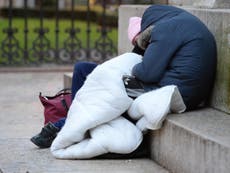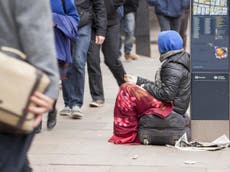It took a pandemic to prove the government wrong about giving everyone a place to live
Housing for the most marginalised needs to be a long-term priority, even when we don’t need it to protect the rest of us

My first thought when Boris Johnson announced a crackdown on social distancing measures last week, was "thank god I’m not in my old flat".
A pokey and damp-ridden three-bed with no living room, no corridors, a tiny kitchen and a broom-cupboard shower room – my flatmates and I were never more thankful for the more liveable place we moved into last year.
My second thought was "how will the people who live there now cope?"
That little flat is sadly reflective of much substandard accommodation which has come to make up the private rented sector in London. If there was ever a worse time for a pandemic to force us all into our homes – it’s in the midst of a national housing crisis.
As home has become the whole world to each of us, we are coming to the same realisation: if we find social distancing hard from our safe and comfortable houses, what must it be like for those who are less fortunate? From survivors of domestic abuse, to lonely elderly people, to those with no home at all, campaigns and support for our most marginalised – and normally forgotten –neighbours have been springing up everywhere.
As someone who campaigns for the needs of the most disadvantaged to be recognised in housing and homelessness policy, this has been a welcome surprise in difficult times. At Commonweal Housing, we run housing projects with specialist partners that are designed to address social injustice.
We are already hearing from our project partners the added pressures their clients are facing. Solace Women’s Aid – our partner on two vital projects for survivors of violence against women and girls – have been inundated with calls to their helpline as women across the country are forced to confine themselves in homes with abusive partners.
Young adult carers in our Move On Up project are disproportionately affected too – with many unable to visit the relatives they care for out of fear of passing on the virus. And nationally, we are seeing calls for an end to punitive no recourse to public funds (NRPF) conditions to tackle migrant homelessness – an issue our NRPF project has been working to address.
But while the housing challenges these groups face have been exacerbated by coronavirus, they existed long before this pandemic brought them into the spotlight.
As the housing crisis has deepened over recent years, those at the margins of society have been hardest hit. In the last year alone, 24,000 survivors of domestic abuse were made homeless; older people and people with disabilities are disproportionately impacted by homelessness; and more than 100,000 migrant households experience destitution annually – to name just a few worst-hit groups.
After a decade of austerity and rising homelessness, the government has now had to act to ensure we all have somewhere to isolate. It seems that when the rest of society is going to be impacted, the needs of the most marginalised become a more pressing priority.
In the last week alone, policy changes that housing charities and experts have been demanding for years have been brought forward seemingly effortlessly. There will be a ban on evictions during the lockdown, Local Housing Allowance rates have risen to cover the recommended lowest 30 per cent of market rents, and local authorities have been told to house all people sleeping rough.
Like so much that has changed for the better in these turbulent weeks, it should never have taken a pandemic for the government to ensure that everyone has somewhere to live. Nor should it have taken isolating in our homes for us to think about how housing hits the most disadvantaged in our society.
Eventually – though it is unclear when – we will resume our normal lives. For most of us, the home will return to what it was before: a welcoming place to come back to at the end of the day.
But for far too many, it will remain a dangerous, squalid, or overcrowded space – or it simply will not exist.
While it will be difficult for the government to justify rowing back on positive measures once we return to normality, most of these policies are not guaranteed to last beyond the pandemic.
The government must ensure housing for the most marginalised is a long-term priority, even when we don’t need it to protect the rest of us. That means investment in genuinely affordable and social housing, as well as providing specialist, tailored housing options for groups who may be nominally housed, but for whom home is not a safe or healthy space to be.
Our eyes have been opened to so many things since the pandemic hit, and we must remember the lessons we learnt the hard way. Now we know what’s at stake, we must make sure everyone has a safe place to live whatever the circumstances – and vow never to put our most vulnerable neighbours at risk again.







Join our commenting forum
Join thought-provoking conversations, follow other Independent readers and see their replies